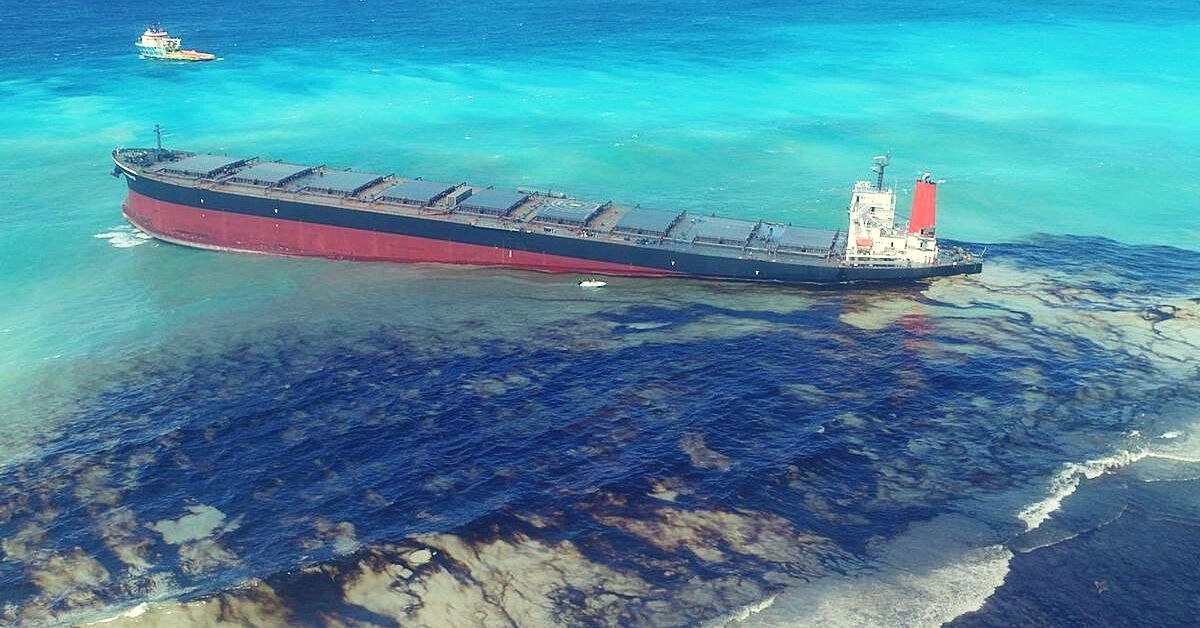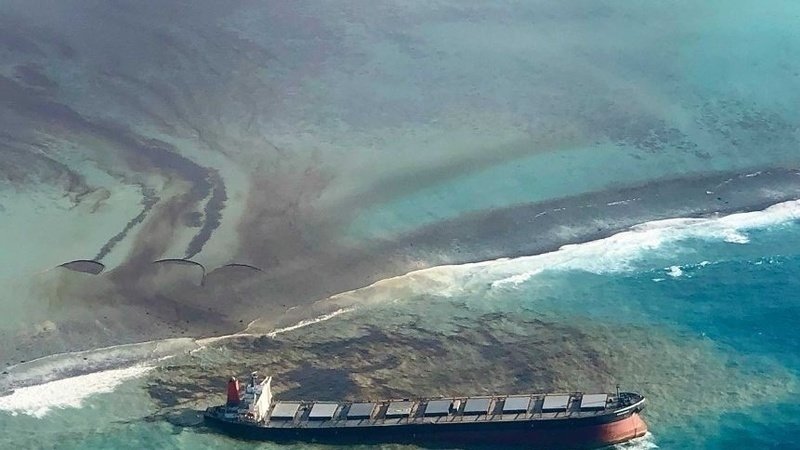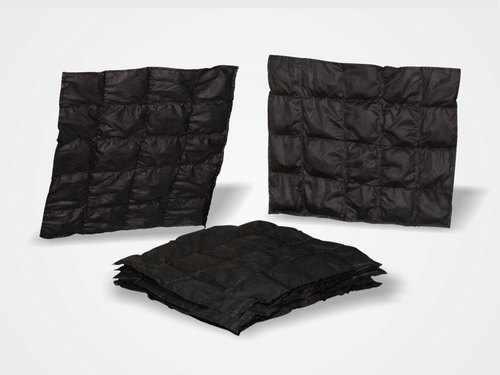India Is Using This Startup’s ‘Sorbene’ Pads to Clean Up the Mauritius Oil Spill
Not only do they absorb oil upto 86 times their weight, these pads can be reused 6-7 times.

On 25 July 2020, a Japanese-owned bulk carrier vessel called the ‘MV Wakashio’ ran aground on a reef at Pointe d’Esny along Mauritius’ south-eastern coastal region, resulting in a massive oil spill which has made headlines all over the world.
Thus far, reports indicate that the ship leaked more than 1,000 tonnes of oil into the Indian Ocean, sparking off fears of an ecological catastrophe for the surrounding sensitive marine ecosystems. Some environmentalists already claim that several dead dolphins have washed up on the island country’s shores as a result of the spill.
According to the BBC, “It’s the location rather than the size of the spill which is causing greatest concern about its potentially serious environmental impact. The stunning turquoise waters of the blue lagoon outside the coastal village of Mahébourg in Mauritius, the backdrop for numerous Bollywood movies, are now stained black and brown.”
The full impact of the spill is still unfolding, but scientists have warned of a significant ecological disaster, which could impact Mauritius and its tourism economy for years to come. Their government has already declared it an ‘environmental emergency’.
As a long time friend of Mauritius, the Indian government responded by rushing in a 10-member response team of the Indian Coast Guard alongside 30 tonnes of equipment including brooms, skimmers, and blowers, among others.
The Coast Guard also brought with itself 10,000 units of Indian made Graphene oil absorbent pads called ‘Sorbene Pads’ for its clean up operation, which was supplied by Log 9 Spill Containment Pvt. Ltd, a Mumbai-based company and wholly-owned subsidiary of Log 9 Materials Scientific Pvt Ltd, a Bengaluru based Graphene nanotechnology start-up.
“Our Graphene-based ‘Sorbene’ pads are able to absorb large volumes of oil and can be reused for up to 6-7 times so that the sorbents can provide more recovery of spilled oil. Besides, Sorbene’s absorbent pads also absorb oil up to 86 times their weight. We are confident these pads shall prove to be instrumental in increasing the efficacy of the oil spill response team by helping them to clean up oil and petrochemicals faster and in larger volumes. We supplied three existing variants of our Sorbene pads, namely the Ultra High Oil Absorbent Pads, High Oil Absorbent Pads, and Oil Absorbent Pads for the emergency operation,” says Dhananjay Sharma, CEO of Log 9 Spill Containment.

How do these Sorbene Pads work?
In a press release issued, earlier this week, the Startup noted:
“While most Sorbents previously available in the market used to absorb and clean oil were made out of a polymer ‘Polypropylene’, Log 9 Spill came up with a sorbent range made of ‘Graphene’ (an allotrope of Carbon). Sorbene pads possess high internal surface area and their hydrophobic nature makes it difficult to get wet and helps to absorb efficiently (oil) spill from land, cracks or water bodies.”
Watch Dhananjay Sharma explain to The Better India below how ‘Sorbene’ Oil Sorbent Pads clean up Oil Spills:

But how exactly does a 22 gm ‘Sorbene’ pad absorb over 4 litres of oil?

What specific role do these pads play in cleaning up a major oil spill?

Testing & Environmental Impact
These sorbent pads were first manufactured in early 2019, while a six-month testing process was completed in the second half of 2018. It was Log 9 Materials, which first manufactured these products before handing over the entire process to its offshoot Log 9 Spill Containment Private Limited, while it continued to focus on R&D for other graphene-based products.
Dhananjay claims that these Sorbene pads are significantly more environmentally friendly than corresponding products manufactured by their competitors.
“Our products are very lightweight (22 gms), and over its lifecycle can be reused about five-six times. Most Polypropylene-made pads, meanwhile, weigh anywhere upto 100 gms and can be used only once. To clean up about 1 barrel of crude oil which contains 159 litres, if you need to absorb it for one cycle, about 94-95 Sorbene pads will be required. Similarly, 150-200 comparable Polypropylene pads will be required. As a result, only 2 kg worth of products will be sent out for disposal at a time, vis-a-vis 6-16 kgs of any other product. On incineration, no harmful chemicals or gasses are released. It’s mainly carbon, and once it burns, it does not release harmful compounds. Overall, it’s an environmentally safe product,” he claims.

“Log 9’s spill containment products have shown tremendous potential in the marine spill containment industry. Not only do they have high efficiency because of graphene being at their core, but are also reusable and safe to dispose of,” said L Yin, Marketing Manager at Indo-Nordic Maritime Services, a customer of Log 9, speaking to Business Standard.
Further affirmation of Log 9 Spill Containment comes from Dr. Ashok Misra, an honorary professor at IISc Bangalore. “[Their] products leverage the tremendous potential of graphene as a material to contribute to a cleaner future by being more efficient than conventionally used materials,” says Misra, in a conversation with the same publication.
“Oil spills have potentially disastrous consequences for society, economically, environmentally, and socially. Spills like these destroy the marine ecosystem and leave a clean-up process that can take up to decades. Innovative technologies and products that reduce the response time and resources required are needed for a more effective cleanup process. Products such as highly absorbent, reusable ‘Sorbene’ pads produced by us can not only reduce the number of pads required for cleanup, but they also help in reducing the disposal quantities,” says Akshay Singhal, CEO, Log 9 Materials.
(Edited by Vinayak Hegde)
Like this story? Or have something to share? Write to us: [email protected], or connect with us on Facebook and Twitter.
This story made me
-
97
-
121
-
89
-
167
Tell Us More
If you found our story insightful, informative, or even just enjoyable, we invite you to consider making a voluntary payment to support the work we do at The Better India. Your contribution helps us continue producing quality content that educates, inspires, and drives positive change.
Choose one of the payment options below for your contribution-
By paying for the stories you value, you directly contribute to sustaining our efforts focused on making a difference in the world. Together, let's ensure that impactful stories continue to be told and shared, enriching lives and communities alike.
Thank you for your support. Here are some frequently asked questions you might find helpful to know why you are contributing?



















